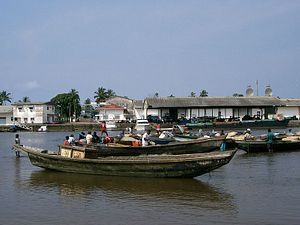China is investing in ports from Malaysia to Mozambique as part of its vision for a Maritime Silk Road (MSR) linking eastern China with Europe via the Indian Ocean, Red Sea, and Mediterranean Sea. With the ambitious plan drawing more attention to the pros and cons of Chinese investment in other countries’ maritime infrastructures, it’s a good time to look at how one such project played out: The Kribi Port project in Cameroon.
Cameroon’s largest port is in Douala, which accounts for 95 percent of Cameroon’s imports and exports. But the Douala Port is not a deepwater port and so Cameroon set out to build a one at Kribi – with China’s help. China Harbor Engineering Company Ltd. broke ground on Kribi Port in June 11, 2011. The first phase of the project is already finished and will be handed over to the Cameroonian government later this year.
The contract value for the first phase was set at $568 million, of which 85 percent was provided as a preferential loan from China’s Export-Import Bank and 15 percent was paid by the Cameroonian government. However, final construction costs were estimated to be $1 billion. As with so many of these investment projects, China’s involvement provided a way for a cash-strapped local government to boost infrastructure capabilities on the cheap.
The next phases of the project will continue to expand the port by building new shipping berths, with the completed port to have a capacity of over 100 million tonnes per year. The deputy coordinator of the port project, Hand Bahiol Magloire, told Xinhua that the port project will boost Cameroon’s economy. “The Kribi Port will become an economic hub to promote economic growth in the southern region as well as the whole country,” he said.
Cameroon is rich in natural resources, especially iron, aluminum, oil, and natural gas; the government hopes the new port will make it easy to export those good around the world. It will also make life easier for the Chinese companies already working to extract those resources, such as oil firm Yan Chang Logone Development, which has a $62 million contract for exploration and production sharing with Cameroon’s National Hydrocarbons Corp.
And the port is only part of the story. Work continues on roads and railways to link the new port to major urban areas, including the capital of Yaounde — projects also associated with Chinese companies. The ultimate goal is to have an industrial zone of 260 square kilometers associated with Kribi, currently a city of 55,000 people best known as a resort town. The plan has sparked an “urbanization master plan” designed to modernize Kribi’s roads and buildings. Cameroon hopes Kribi port will eventually become a shipping center not only for the country, but for all of West Africa.
In other words, the Kribi project is far more than just a port — it’s an attempt to create an entirely new business and industrial hub in Cameroon. Chinese projects in Colombo, Sri Lanka, and Gwadar, Pakistan (all associated with the MSR) are equally ambitious. The multi-layered nature of these projects should put to rest the idea that they are primarily intended as to accommodate future PLA Navy missions (although, as we saw in Sri Lanka last year, Chinese ships will likely pay visits to these new ports). Rather they are designed to push forward economic growth in developing nations – both creating new markets for Chinese goods and making it easier for China to extract the resources it needs – all while providing lucrative contracts for Chinese companies.
As with other Chinese development projects, there are criticisms of this strategy. Kribi locals complain of their homes and businesses being demolished to make way for new construction. Anticipation of Kribi’s future as a trading hub has also caused an influx of migrants, raising housing and food prices in the town. Further, there have been complaints that many of the jobs involved in port construction, even menial work like truck driving, went to Chinese workers rather than Cameroonians. Of the 1,125 people at work on the harbor in August 2013, only around half (609) were Cameroonians. But the Cameroonian government argues that the long-term benefits (including future job creation) will be a boon for the country.
Obviously, each country and investment project is different, but potential recipients of Chinese investment for the Maritime Silk Road have plenty of precedents to look at as they decide what is right for their countries. Kribi Port in Cameroon is just one example of what a Chinese-built port can look like — pros and cons alike.

































